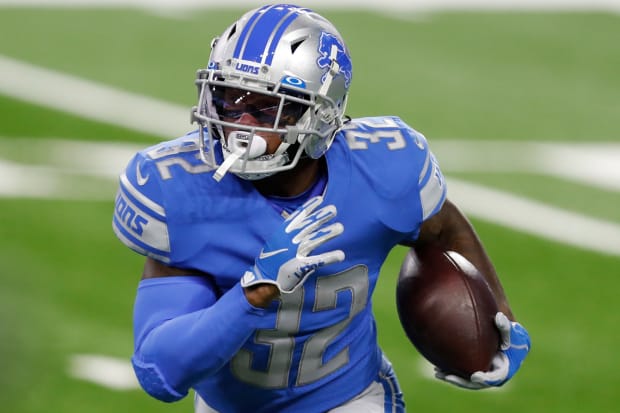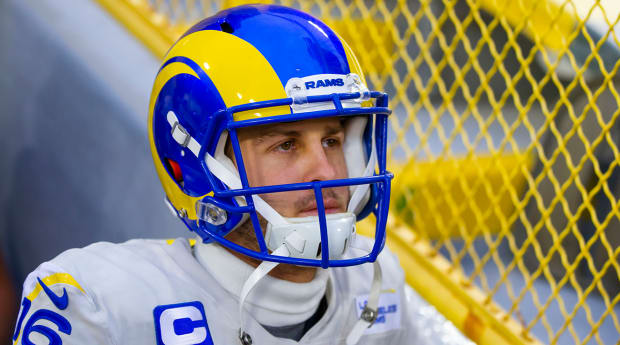Since drafting Barry Sanders back in 1989, the Detroit Lions can't seem to catch a break at the running back position
The Curse of the Bambino. The Curse of the Billy Goat. The SI cover jinx. The Curse of the Madden cover. Sports have more than their share of curses over the years. Well, I might have stumbled upon another sports curse. I'll call it the "Curse of Barry Sanders."
In 1989, the Detroit Lions drafted Sanders with the third overall pick in the NFL draft. He went on to become one of the greatest running backs not only in the history of the NFL but also in the world of fantasy football. He rushed for over 1,000 yards in each of his 10 seasons in the league, including 2,053 yards in 1997. He also rushed for double-digits in touchdowns six times and finished his career with 15,269 rush yards and 109 scores. Despite rushing for 1,491 yards, Sanders decided to retire after the 1998 season.
Running Backs in Recent Draft History
In the 22 years since Sanders left the Detroit franchise, the team has drafted 19 running backs. Of those 19 runners, nine were drafted in the first three rounds (two in Round 1, four in Round 2, three in Round 3). The results have been, well, not good.
Let’s focus on the most prominent selections at the position, starting with the 2000 NFL Draft and Reuben Droughns. He finished his career in Detroit with 72 rushing yards. Droughns rushed for 1,200+ yards twice in his career, but both came in Denver.
In 2004, the Lions selected Kevin Jones with the 30th overall selection in Round 1. He had a respectable rookie season, posting 1,133 yards on the ground while finishing as the RB21. His best season from a fantasy standpoint came in 2006, when he had 61 catches with eight total touchdowns and finished 15th in points among running backs.
Unfortunately, Jones’ other two seasons with the Lions were forgettable due to injuries and a lack of statistical production. He finished his career with the Bears in 2008.
The next two running backs the Lions selected in the first three rounds of the NFL draft, Brian Calhoun (2006) and Kevin Smith (2008), did not meet expectations. Calhoun had just 14 carries over two seasons (11 games) with the team. Smith was much better, at least in his first two seasons, ranking RB17 as a rookie and RB21 in 2009. He would play in just 25 games over his final three seasons in Detroit, however.
In 2010, the Lions took the explosive and versatile Jahvid Best with the No. 30 overall pick in the NFL draft. He was a mid-tier RB2 as a rookie, finishing 19th in fantasy points among runners on the strength of his 58 receptions. That was the extent of his success, though, as he played just six games the rest of his career due to concussions.
The next three runners the Lions drafted in one of the top three rounds were Mikel Leshoure (2011), Ameer Abdullah (2015), and Kerryon Johnson (2018).
Leshoure missed his entire rookie campaign with a torn Achilles tendon. After serving a two-game suspension the following season, he totaled over 1,000 scrimmage yards and nine total touchdowns. Those numbers were good enough for him to finish as the RB19. However, Leshoure would be released in 2014 after playing just three more games.
Abdullah was considered a prominent sleeper in fantasy football circles after being selected in the 2015 draft. Still, he was unable to meet expectations. In fact, he failed to rank better than 49th in fantasy points among backs in his time in the Motor City.
The next high pick the Lions made at running back was Johnson. He, too, was labeled a sleeper or breakout candidate in fantasy land. He certainly showed some potential as a rookie with 641 rushing yards and a 5.4 yards-per-attempt average in 10 games. Injuries limited Johnson to eight games the following season. However, he was ineffective to the point where the Lions signed 35-year-old veteran Adrian Peterson.
The D'Andre Swift Era

In part, Johnson's lack of durability also led to the Lions landing D’Andre Swift in the second round of the 2020 NFL Draft. And that's where we stand now with the Lions backfield. Like Jones, Best, and Johnson before him, Swift is now considered a potential sleeper & breakout candidate among countless fantasy football analysts. The label is warranted, too, at least from what we saw from him as a rookie runner.
Although Swift was second in carries among Detroit backs behind Peterson, he still finished 18th in fantasy points at the position. And in five games where he had at least 15 touches for the Lions, Swift averaged a very impressive 20.8 fantasy points.
But haven’t we seen this before from highly-drafted Lions runners?
Jones was the RB21 as a rookie, Smith finished 17th, and Best ranked 19th in their first NFL seasons. Jones was the lone back to have a better season than what he put up a rookie, but his high-water mark was finishing 15th in fantasy points among backs (2006). For the most part, not one of the Lions' drafted RBs since Sanders has met expectations. In fact, the exact opposite has been the case.
This all might mean absolutely nothing as it pertains to Swift, of course, And for those who don’t buy into trends, well, all of this information doesn’t mean a hill of beans. So, let’s get into some of the other red flags when it comes to Swift heading into 2021.
Looking Ahead to 2021
Detroit's attack looks like it'll be run-heavy with new offensive coordinator Anthony Lynn and running backs coach Duce Staley at the helm. That's good news for Swift. The offensive line has promise with Taylor Decker, Frank Ragnow, and Jonah Jackson, but the right side still has question marks. Halapoulivaati Vaitai’s first season with the Lions was marred due to injuries, and Tyrell Crosby was inconsistent at best in 2020.
The Lions could add some help in the NFL draft, but right now, it's not what I would label a strength. At this point, I'd take a wait-and-see approach with this offensive unit.
In free agency, the team added Jamaal Williams into the backfield mix. He rushed for at least 460 yards in each of his four seasons with the Green Bay Packers, and he’s also had at least 30 catches in each of the last two seasons playing behind Aaron Jones. I don't suspect that Williams will push Swift for the starting role, but could he take enough touches to take Swift out of the breakout player conversation? Absolutely.
Last season, Williams saw an 18.4 percent touch share and averaged about 11 touches per game in Green Bay. That's right around the same number of touches Peterson (10.5) had in 2020. Williams was also targeted 35 times as a pass-catcher. That's almost double the number of targets Peterson recorded and nine more than Johnson.

The Lions also have major questions as an offense overall. Jared Goff, who the Rams couldn’t wait to get off their roster, was dealt to the Lions for Matthew Stafford in a deal that included multiple first-round picks. Goff did shine in 2018, but he’s regressed over the last two seasons. He also doesn’t have very many weapons on the offensive side of the football, as both Kenny Golladay and Marvin Jones Jr. left as free agents. The Lions are in a position to get one of the top three wideout prospects in the NFL draft, but there won’t be much else aside from T.J. Hockenson in terms of pass catchers.
Am I Buying Swift Next Season?
Detroit will also be one of the worst teams in the NFL next season. That means a lot of negative game scripts and the potential for Swift to see his carries reduced as a result. This could mean more opportunities as a pass catcher, but Goff threw just 10.8 percent of his pass attempts to running backs in his final two seasons with the Rams. Williams is also a good receiver out of the backfield, so all those targets aren’t destined for Swift.
Don’t get me wrong, because I feel like Swift has the talent to be a potential No. 1 fantasy running back next season. But talent isn’t always enough to fill the stat sheets. And based on the utter failures of previous backs the Lions have drafted (one top-15 fantasy runner in 22 years), coupled with the addition of Williams and the potential for plenty of negative game scripts, I’d temper my expectations. If you do draft Swift, I’d be expecting no more than a mid-tier RB2 finish in fantasy points.
Should Swift falter, maybe this Curse of Barry Sanders will get some legs…
MORE ARTICLES FROM MICHAEL FABIANO
Michael Fabiano is an award-winning fantasy football analyst on Sports Illustrated and a member of the Fantasy Sports Writers Association (FSWA) Hall of Fame. You can follow Michael on Twitter, Facebook, YouTube, and Instagram for all of the latest breaking fantasy football news and the best analysis in the business!

More NFL: